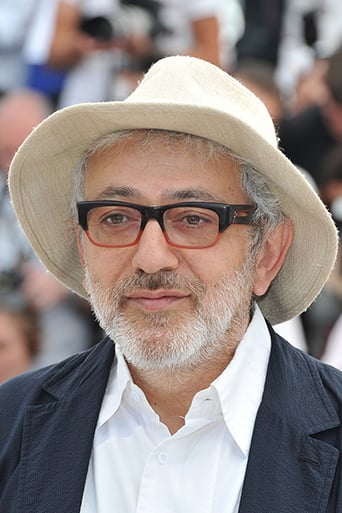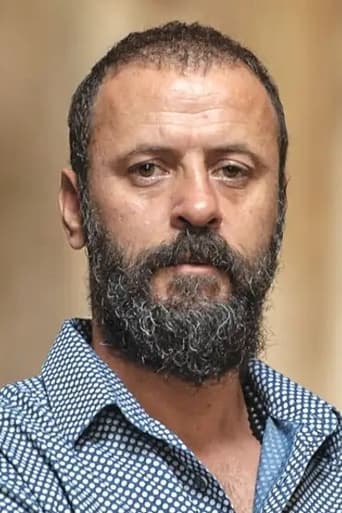SunnyHello
Nice effects though.
Pluskylang
Great Film overall
Forumrxes
Yo, there's no way for me to review this film without saying, take your *insert ethnicity + "ass" here* to see this film,like now. You have to see it in order to know what you're really messing with.
Chris Knipp
The title "Chronicle of a Disappearance" has misled you if you expect a tale of mystery or espionage. In fact it's hardly a literal chronicle at all. It's mostly just vivid little fragments from a few people's mundane lives. Only toward the end we see how everything points back to the director and his dilemma as an essentially stateless person. He's a Palestinian Arab back in Jerusalem after twelve years of film study and residence in New York and he's overwhelmed with a sense of irony and powerlessness. The movie is composed of short snippets, many of them static. The texture and style resemble closely Suleiman's more recent -- and more effective -- effort, "Divine Intervention" (Yadon ilaheyya, 2002). The latter holds together better through using recurrent scenes and themes. And it achieves greater emotional resonance through focusing on a couple whose meetings are blocked by Israeli checkpoints. But this first full-length film has the same wry humor and thoughtful observation that we see in Suleiman's latest work.This chronicle-less "Chronicle" lacks continuity and is choppy, at times seemingly almost meaningless. Even directors with static camera styles like Ozu, Hou, or Tsai could seem action directors by comparison. Nonetheless those of us who've spent some serious time in the Arab World are delighted by certain moments, such as the Matisse-like image of a fat lady sprawled asleep on a sofa while a particularly soulful rendition of the Moslem call to prayer echoes in the background; or various little ironic, highly Arab gestures like the men ritually lighting each other's cigarettes; a pair who jump out of a car to fight but are stopped by passers-by; women preparing garlic and chattering in a kitchen; the classic image of guys sitting on stiff little straight-backed chairs smoking in front of a shop, and so on.An ironic update on the culture comes when we see a man (the filmmaker's father) playing backgammon, the essential café game, alone in his room on a computer -- but still puffing on a café-style water pipe. This is mentioned in a review online by an American Jewish writer, half of whose reactions are negative and stereotypical for one of his background. This points up how easy it is to misread such quiet work coming from such a violent region. It's interesting in itself that Suleiman makes avantgardist films from the point of view of a Palestinian resident in Jerusalem. In this theater of engagement and conflict, he is quiet and detached. His work is wryly political, but always deftly ironic, understated, resigned. Those who find clearcut advocacy in Suleiman are probably misreading him and violating the subtlety of his thinking. Since Suleiman's vision is highly personal it inevitably includes his Palestinian identity, but his essential point is the way that identity makes him a non-person. This, then, is the "disappearance" the film chronicles.Suleiman himself is his own perfect star. With his sad, sensitive face, he's an Arab Buster Keaton. He appears at a gathering where he is introduced and applauded but cannot even begin to describe his film-making because mike feedback and loud cell phone conversations in the audience continually interrupt him. Another time his new flat is invaded by two Israeli soldiers who march around, ignoring him, and then troop out, later including him only near the bottom of their inventory of the flat's contents.This is a cinema of understatement, so much so that one can easily miss what's there: you're lulled by the static quality and minimalism into missing the ironies. One writer for instance comments that the night boating fishermen "dis" everyone on shore, overlooking he fact that the speaker is trashing everyone but the relative of the man sitting next to him, whom he says are tops--a simple enough joke, and yet one that slipped by. Perhaps the IMDb Comment by a writer from Tel Aviv is wisest in saying that this "Chronicle" is "highly recommended" because there are moments of "brilliance" but also cautions that "the film does not flow and never really follows a set rhythm." (No doubt other Israelis would also find the IDF buffooneries funny -- this one calls Suleiman's Israeli soldiers "dumb and dumber.") American Jewish viewers, sometimes more extreme, have considered it an affront that a filmmaker who designates himself as Palestinian should set a movie in Jerusalem -- as if by doing so he were claiming Israeli territory. In fact Palestinians do live in Jerusalem, as they long have. Simplistically pro-Israeli US viewers may have trouble with the fact that Suleiman's "terrorist" is a woman whose strapped-on bomb tripwires set off nothing more than a fireworks display, and whose derailing of IDF patrols by speaking Hebrew with a good accent into a found walkie-talkie is nothing but an absurdist practical joke. (Her good Hebrew doesn't enable her to rent an Israeli-owned flat, even over the phone; once they hear her name, they reject her.) Other tools of terrorism such as hand grenades turn out to be merely cigarette lighters; viewers of "Divine Intervention" will recall the hospital where everyone constantly smokes, even patients on IV's. Efforts to pigeonhole Suleiman are clumsy. This is, however misleading the title, the chronicle of a disappearance: Suleiman is an invisible man, like Ralph Ellison's African American, who does not exist and has no voice in the place of his birth. Suleiman's world is one in which people are powerless. His chief weapon is wry humor.The film appeals only to a small audience, and even they have reservations: but from this first effort Suleiman has staked out a special aesthetic, technical, stylistic corner of the cinematic world in as distinctly his own, and for that he deserves full credit.________________________ Watched on a Fox Lorber-released videotape. I reviewed "Divine Intervention" during its original US theatrical release and you can find my comments on my personal website as well as here.
markboulos
When I saw this at the National Film Theatre on the South Bank, I was a bit nervous, because I knew nothing of the film and had invited three friends (all of us filmmakers). Afterwards they all thanked me for bringing them--we had laughed through the entire movie, with the whole audience. The film is largely composed of seemingly unrelated comedy sketches. The comedy is very simple, often physical, sometimes surrealist. Every joke is funny. The film is a poignant comment on the Israeli Occupation of Palestine, but made before the New Intifada, so there is not the gravity of Suleiman's celebrated 'Divine Intervention.' Please see this film, it's absolutely wonderful.
kwhatever55
My guess regarding all the props used in the film, is that is was created to break expectations of genres and stereotypes of Palestinians. We see a beautiful Arab woman unable to rent a flat in Jerusalem because others can tell over the phone that she is arab and not Israeli. We then see her with two men strapping wires around her, telling her where the remote is, and where to insert the powder. This turned out to be a fireworks display they were showing her. The viewer will also see things such as guns and grenades, which turn out to be lighters, Israeli police hastingly exiting a van with their rifles and lining up against a wall so they can all pee together next to each other. Our main character, the director, is somehow unable or chooses not to speak in this film. After coming back from NYU, Suileman is supposed to return to Palestine to present a film about peace, and is unable to speak, or is never given the chance to even when on a podium. Long takes, long moments of silence, and constant humored dialog and dashed expectations are what makes this mysterious film. Theres a mix of languages, including Arabic, English, French, Russian, and Hebrew. So many things about it, a college course could be taught on it. This is not the film you want to see if you are looking for propaganda, rather it falls more into the art film realm.
dzong
First of all, let's get one thing straight....I love foreign films. I even love Iranian films (at least I loved Colours of Paradise). And yet I didn't think I would ever get through this movie and it's not that long. I would have no idea what it was about if I hadn't read the back of the box.In brief, the "movie" consists of a long series of interminable vignettes, usually with no dialogue, no character development, and no point. Every 20 minutes or so (seems like longer), there is an actual scene with some interesting characters who for the most part are not heard from again. Then there's some nonsense about a Palestinian woman who gets hold of a Police CB. I was looking forward to seeing a Palestinian film to see what a Palestinian director would have to say...Not necessarily about the Israeli-Palestinian conflict (though that would be interesting too...) but about SOMETHING, damn it! This film was a huge disappointment. Don't watch it unless you are expecting a documentary, and a dull one at that.

